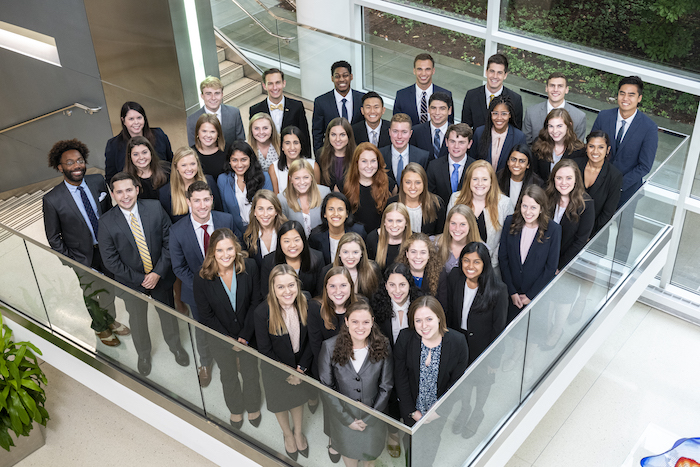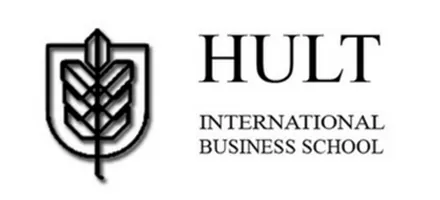
Georgia Tech Scheller students. Scheller photo
SOME STRONG EMPLOYMENT OUTCOMES DESPITE PANDEMIC
More than a ranking, this project results in the largest trove of undergraduate business education-specific data available anywhere. In the forthcoming days, we’ll be publishing all the underlying data upon which the ranking is based. Readers are encouraged to parse those supporting metrics to gain a better understanding of the strengths and weaknesses of the schools ranked this year. It’s one way to discover some of the hidden gems on the list. An example: Only three schools reported that 100% of the students in the Class of 2020 had at least one business-specific internship before graduation. Those were Marian University in Indianapolis, the Rochester Institute of Technology, and Syracuse University.
This year, three schools had an employment rate of at least 98%. Hult International Business School led the way with 98.5% of 2020 graduates seeking employment accepting full-time jobs within three months of graduation. The University of Minnesota’s Carlson School of Management and UNC Kenan-Flagler followed with 98.1% and 98.0% finding jobs, respectively.
Despite the global pandemic’s toll on the economy, business students were still able to land jobs at a high rate. Of course, it’s likely many 2020 graduates already had their employment locked-in before the COVID really wreaked havoc. This spring’s graduating class will likely be a better indicator of how the pandemic is impacting the market’s valuation of the business degree. This year saw a record four schools with average starting salaries above $80,000. Another dozen schools placed their graduates into positions where the average starting salaries were at least $70,000 a year.
SAME METHODOLOGY BALANCED ACROSS THREE CATEGORIES
This year, as in the four previous years, a school’s ranking is based on a balanced methodology that gives equal weight to three primary criteria: admissions standards, the academic and co-curricular experience as measured by student satisfaction, and employment outcomes. All of the data used to calculate the rankings is self-reported by the schools or from alumni through extensive surveys. Every February and March, participating schools are invited to comment and make suggestions for improvements in a ranking that was originally created in collaboration with several leading business schools. Those proposals are then carefully considered before any updates are made. Recent graduates of the programs are surveyed for their opinions between June and November.
Schools have a chance to earn 100 points in each category. A weighted scale is used to award schools points based on how they compare with each other. In the admissions category, for example, the acceptance rate is given a 30% weight, the average SAT gets a 35% weight, and the percentage of students from the Class of 2018 who were in the top-10% of their high school class is also given a 35% weight.
Some 15 schools had acceptance rates lower than 20% last fall. For average SAT scores, WashU Olin had the highest average SAT score at 1,510. NYU Stern averaged 1,507, Wharton had 1,504, and Notre Dame’s Mendoza College reported an average of 1,500 for students entering last fall. Schools recruiting the highest percentage of top 10% high school grads were the Worcester Polytechnic Institute’s Foisie School, with 100%. Carnegie Mellon and Georgetown followed with 95.5% and 90.9%, respectively. Unlike other rankings, including U.S. News, which uses university-wide data, all of the metrics collected by Poets&Quants is business-school specific, making it far more valuable to applicants and their parents.
In measuring the quality of a student’s academic experience, questions range from how likely the alums would be to recommend their business schools to close friends and family to how accessible faculty and alumni were to students. how helpful advising and career services staff were. Alumni also were asked to rate their satisfaction with career services and advising and if they were able to land not just any job, but the job, industry, and company they targeted for employment. Schools must meet a minimum 10% alumni response rate to have their alumni scores count towards the final ranking. This year, some 6,183 alumni responded to the survey sent to 52,662, for an overall response rate of 11.7%.
ALUMNI SURVEY REVEALS WHERE CERTAIN SCHOOLS EXCEL
The highest weighted data point of the entire ranking’s methodology, given a weight of 80% within the Academic Experience category, is the average of the 16 alumni questions on a one-to-10 scale. This year the Class of 2018 alumni from Georgia Tech’s Scheller College gave their experience the highest overall approval, averaging 9.35 out of a possible 10.0. Following Georgia Tech was Virginia’s McIntire School (9.28) and Wharton (also 9.28). Rounding out the top five were Southern Methodist Cox (9.20) and Indiana Kelley (9.19).
Once again, our surveys showed that business education alumni are very satisfied with their undergraduate experiences. The first question we ask alumni is how likely they are to recommend their undergraduate business program to a close friend or colleague. Alumni at Virginia McIntire had the highest score at 9.79, followed by Wharton (9.70) and Indiana Kelley (9.69). We also ask the alumni to evaluate how well their individual schools prepared them for the world of work. Virginia McIntire and Wharton tied for the highest score at 9.57. Once again, Indiana Kelley followed in third with 9.47. Alumni are also asked to evaluate if their degrees were worth their cost in tuition and time and resources. For tuition, Brigham Young’s Marriott School earned the highest marks at 9.70. BYU was followed by Georgia Tech (9.59) and the University of Texas-Austin McCombs School (9.28). For time and resources, Wharton, Virginia McIntire, and Georgia Tech topped the list, respectively, scoring 9.77, 9.61, and 9.51. For the results of all 16 questions, see the Report Card.
In assessing student satisfaction with a program’s academics, we also asked alumni if they had a “signature experience” or an international immersion through the business school. NYU’s Stern School was awarded the highest marks, with an average of 86.3% of graduates answering in the affirmative. Minnesota’s Carlson School followed with 84.3% and Hult International Business School rounded out the top-three with 79.0%. Lastly, we asked alumni if their first jobs after graduation were at a desired company and industry. Leading the way was Bucknell where an average of 96.2% of the Class of 2018 reported their first jobs being in a desired industry, desired company, or both. Rounding out the top three were Georgia Tech (91.8%) and Cornell Dyson (91.7%).










